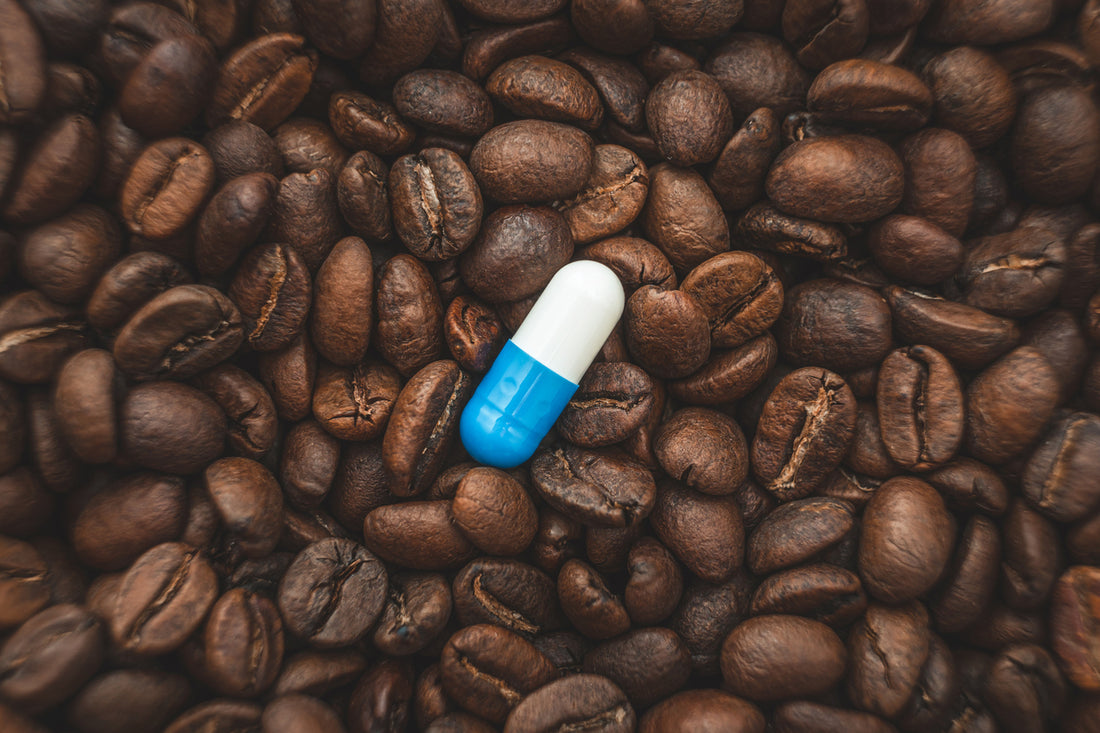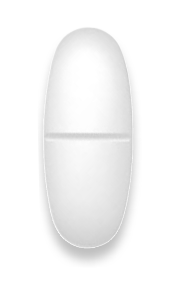Are caffeine pills safe? Learn how they affect sleep and waking

- Caffeine pills are a popular way to get a boost of energy and alertness, but it's important to understand how they work and how they can affect your sleep and waking process. Side effects of caffeine can include anxiety, dizziness, dysphoria, rapid heartbeat and high blood pressure, headaches, and sleep problems.
- Certain groups of people, such as people with liver disease, heart problems, high blood pressure and stomach ulcers, should avoid caffeine tablets altogether.
- Alternatives to caffeine pills to wake up include drinking water, exercising, taking cold showers, meditating, and taking a wake-up agent like B・SYNC ON.
- B・SYNC ON helps you become more conscious and avoids the negative effects of strong stimulants and the crash that often follows their use.
Caffeine tablets, also known as decaf pills, are a common and popular way to boost energy and alertness. They can be taken as an alternative to coffee and other caffeinated beverages, or simply as a convenient way to get an energy boost. However, it's important to understand how they work and how they can affect your sleep and waking up.
Caffeine pills work by quickly releasing caffeine into the bloodstream, which can give you a temporary boost of energy and alertness. This can be beneficial during the day, but it can also interfere with sleep at night. Caffeine stimulates the central nervous system, which can make it harder to fall asleep and stay asleep.
If you take a caffeine tablet too close to bedtime, it can also affect your ability to wake up. Caffeine stays in your body for several hours after consumption and can cause you to wake up earlier than usual. This can be particularly disruptive if you rely on a regular sleep schedule.
Overall, caffeine pills can be a safe way to get a boost of energy and alertness. However, it is important to consider how they affect your sleep and waking and to take them with caution. There are also some alternatives that are healthier than caffeine to improve your sleep and waking, which we will talk about in this article.
What is caffeine? Is it problematic?

Caffeine is called the world's most popular drug for good reason - it's used in many forms and by many people. You can find it in coffee, tea, energy drinks, soda, chocolate, and even some medications. Caffeine is a stimulant, meaning it can increase alertness and improve concentration.
But it can also be problematic. Caffeine can be addictive, leading to tolerance and dependence. It can also cause insomnia and disrupt sleep patterns. Caffeine can also increase anxiety, which can make it difficult to relax and fall asleep. In addition, caffeine can increase heart rate and blood pressure, which can be dangerous for people with certain health conditions.
How caffeine affects sleep
The most important thing to know about caffeine is that it is a powerful stimulant. It doesn't take long to hit your body, and its effects can last for hours.
Caffeine stimulates the central nervous system, which can make it difficult to relax and fall asleep. It can also disrupt your body's natural sleep cycles, making it difficult to stay asleep.
In addition, caffeine can increase your heart rate and blood pressure, which can be dangerous if you have a heart condition or high blood pressure.
Another big problem with caffeine is how your body reacts when the effects wear off. For example, if you wake up by taking caffeine pills, you're likely to crash once the caffeine wears off. This can leave you feeling tired and making it harder to function throughout the day. It can also affect your mood and energy levels when you want to be most productive.
Caffeine pills vs. coffee: How long does it take for caffeine pills to take effect?

The active ingredient in caffeine tablets and coffee is the same - caffeine. However, there are some important differences that you should know.
First, caffeine pills are more concentrated than coffee. This means that caffeine pills can provide a stronger energy boost and increased alertness, but it also means that you may experience stronger caffeine side effects.
Second, caffeine pills release the caffeine immediately into your bloodstream. This can be beneficial if you need a quick energy boost, but it can also make it difficult to sleep at night.
Finally, caffeine pills are not associated with the same health benefits as coffee. While coffee contains antioxidants and other health-promoting compounds, caffeine pills do not have the same health benefits.
How much is too much caffeine?
According to the FDA, about 400 milligrams of caffeine per day is considered safe for humans. However, there are some restrictions, both in terms of who consumes the caffeine and in terms of the dose and concentration. For children and adolescents, the amount of caffeine should be less than 400 milligrams per day. Additionally, people with certain medical conditions may need to further reduce their caffeine consumption.
It's also important to know that different forms of caffeine can work differently. For example, caffeine tablets provide a more intense and immediate caffeine hit, while coffee provides a more gradual release. That's why it's important to understand your own body and what works best for you.
Overall, caffeine can be a helpful tool for increasing energy and alertness, but it's important to know how it can affect you and your sleep. When consumed in moderation, caffeine can be a safe and effective tool for increasing alertness and improving focus. However, it's important to be cautious, listen to your body, and understand how it can affect your health.
Side effects of caffeine and risks of caffeine pills

Caffeine tablets can cause unwanted effects, especially when consumed in large quantities. Possible side effects of caffeine tablets include:
Anxiety and nervousness
Especially for people who are sensitive to caffeine, jitteriness is a possible side effect of caffeine that is best avoided. Because caffeine tablets are taken in concentrated doses, the effects can be more pronounced and harder to control.
dizziness
When you first take a caffeine tablet and it enters your body, it can cause a feeling of dizziness. This can be accompanied by a feeling of lightheadedness and it can be difficult to focus or concentrate.
Dysphoria
It is possible that it may have a negative effect on your mood and make you feel depressed or dysphoric. This may be particularly pronounced if you are taking caffeine tablets, as their effects may be more intense.
Fast heart rate and high blood pressure
Caffeine can cause an increase in heart rate and blood pressure, which can be dangerous if you have certain medical conditions. It's important to talk to your doctor if you have any concerns.
Headaches and sleep problems
Taking these pills can make it harder to fall asleep and stay asleep, which can lead to feelings of tiredness and difficulty performing tasks during the day. If you take caffeine too close to bedtime, you may also have a headache the next day and feel less energetic and in a bad mood when you wake up.
Who should avoid caffeine tablets

If you drink coffee or are thinking about trying caffeine pills, you're probably wondering, "Are caffeine pills safe to take daily?" While caffeine pills are safe, there are some groups that should definitely avoid taking caffeine pills daily to wake up due to some potentially serious side effects of caffeine pills.
People with liver disease
Liver disease affects the liver's ability to process caffeine. Taking caffeine pills or tablets can cause the body to overload with caffeine, which can be dangerous.
People with heart problems
Caffeine can increase blood pressure and heart rate, which can be dangerous if you have heart problems.
High blood pressure
High blood pressure is a risk factor for strokes and heart attacks, so it is important to be careful with caffeine.
People with stomach ulcers
Caffeine can increase stomach acid levels and worsen existing ulcers.
Caffeine pills can be a convenient way to get a boost of energy and alertness. However, it's important to know how they can affect your sleep and waking, and to be aware of the potential side effects and risks. If you're sensitive to caffeine or have certain health conditions, it's best to avoid caffeine pills altogether.
Alternative ways to wake up
Although caffeine is a popular way to wake up - whether by drinking coffee or taking caffeine pills - there are other ways to wake up that will give you more natural energy and a boost for the morning.
Wake-up supplements like B・SYNC ON

Wake-up supplements like B・SYNC ON are designed to help you start the day with more energy and in a better mood. B・SYNC ON is taken the night before and is the only dietary supplement that supports and improves your waking process. It contains only four natural ingredients , including vitamin B5, vitamin B12, zinc and caffeine, which are contained in each pill.
You can take B・SYNC ON before bed and it will start releasing nutrients around 7 hours later. When you wake up, it will have the effect of a gradual and effortless wake-up, improving your energy and helping you avoid the harshest effects of caffeine.
Unlike caffeine pills or a cup of coffee, B・SYNC ON is designed to help you wake up slowly, avoiding the negative effects of strong stimulants and the crash that can often follow their intake.
Plus, B・SYNC ON helps align your circadian rhythm with your schedule to create a more sustainable wake and sleep pattern for the future. Unlike caffeine pills, you'll feel the positive effects of healthier sleep and wake-up throughout the day.
Find out more and try B・SYNC ON today and order your first pack online .
Drink water
Drinking water first thing in the morning will make you feel more alert and energized. Drinking water first thing in the morning will also help flush out toxins and start your day with a healthy habit.
to do sports
Exercise can be a great way to wake up and get your body going. Incorporating just 10 minutes of movement into your morning routine can increase your alertness and improve your mood.
Take a cold shower
A cold shower can be a shocking but effective way to wake up. Cold water can stimulate your body and prepare your mind for the day.
Meditate
Meditating can help clear your mind and give you a sense of clarity. It's a great way to start your day off on the right foot and give you the energy you need to tackle the day.
FAQ
Are caffeine pills safe?
Caffeine pills or tablets can be safe when taken in moderation and with caution. However, it is important to be aware of the potential side effects and risks, as well as the potential for addiction and tolerance. It is also important to understand how caffeine can affect your sleep and waking up.
How much caffeine is in a caffeine pill?
Caffeine tablets typically contain between 200 and 400 milligrams of caffeine per tablet, but this can vary depending on the brand and concentration.
How do caffeine tablets work?
Caffeine tablets cause a rapid release of caffeine into the bloodstream, which can provide a temporary boost of energy and alertness.
Can caffeine pills help me wake up?
Caffeine pills can help you wake up, but it's important to understand how they work and how they can affect your sleep and waking up. There are also healthier alternatives to improve your waking and sleeping process.













